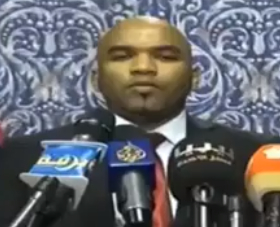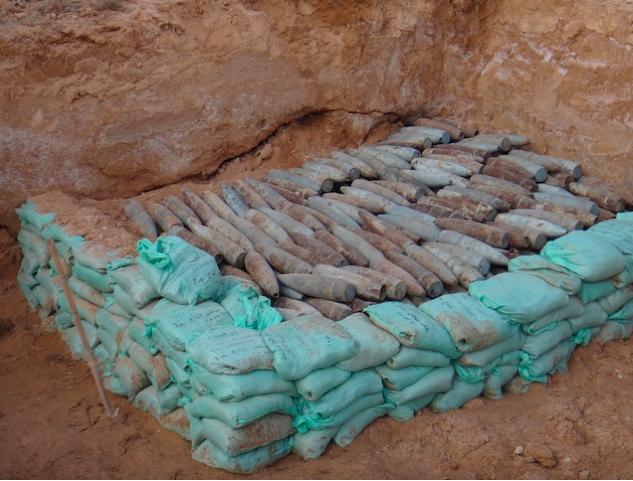Breaking News – Jadhran now refuses to open oil terminals
By Aimen Eljali.

Jadhran speaking today in Ajdabia (Photo: Nabba TV)
Tripoli, 15 December 2013:
Ibrahim Jadhran, head of the self-styled Political Bureau of Cyrenaica, has refused to reopen oil ports in the east of the country, as promised, on the grounds that the authorities have failed to meet the conditions put forward by his federalist movement.
Jadhran had said on Tuesday that he would reopen the oil export terminals at Sidra, Ras Lanuf and Zueitina today on the condition that oil sales were properly monitored and apportioned to the eastern regions.
Today, he announced at an Ajdabia press conference that the terminals will now remain closed as these conditions have not been met.
Mohammed Ibn Tabu, a spokesman for Jadhran’s office, has confirmed to the Libya Herald the continued blockade on the ports, saying that Jadhran was acting the interests of the people of Cyrenaica and all Libya.
The decision now puts Jadhran on a collision course with elders from the Moghrabi tribe who thought that on Wednesday, after ten days of talks, they had brokered an end to the blockade of the ports. The elders said they would dissociate themselves with any group looking to harm the national interest,
Tension on Tripoli streets as petrol crisis enters third week
By Houda Mzioudet.
Tripoli, 14 December 2013:
As the petrol crisis in the capital moves into its third week, the National Security Directorate of Tripoli has said it had detained groups of individuals last night vandalising petrol stations.
Issam Ennas, spokesman for the National Security Directorate of Tripoli, told the Libya Herald that his men, who are now tasked with managing queues at petrol stations and guarding fuel tanks, had arrested groups sabotaging petrol stations. He could not however give precise numbers of those detained.
Ennas dismissed out of hand reports that two people had died yesterday in armed clashes in the Fornaj area, east of Tripoli.
Ennas confirmed that police and the army were once again deployed at filling stations across the capital but as the evening comes on the situation on the ground is becoming more tense. Queues of two kilometres, hundreds of cars-long, can be seen in Tripoli’s streets as drivers wait hours to fill their cars. The tail-backs are causing further traffic jams as they snake their way round corners and down adjoining streets and alleyways.
As the crisis continues, drivers are becoming more desperate and petrol is being sold online at a high mark-up. On Open Souk, an online marketplace, 20 litres of petrol reached a price of LD 7 more than double its normal cost.
On Friday, the manager of Brega Oil Company, Faraj Al-Kimishi, stated that petrol would be available in all the company’s petrol stations and the process of fuel provision should be continuing as normal. The company has supplied the capital’s 22 petrol stations with 3,100,000 litres of petrol and 1,700,000 litres of Diesel.
The petrol shortage has raised questions over the strength of Tripoli’s petrol infrastructure. There are only 22 filling stations in Tripoli to service a population in excess of a million. Each forecourt also has a limited storage capacity, a legacy of the former regime which sought to limit the profitability of petrol station ownership.
Fifty tonnes of ammunition destroyed in Misrata
Tripoli, 14 December 2013:
Fifty tonnes of ammunition has been destroyed in one of the largest ever controlled demolitions in Libya.
Organised by international NGOs specialising in the removal of unexploded ordinance, Handicap International and the Mines Advisory Group (MAG), two batches – each of 25 tonnes – were destroyed on Friday near Misrata.
A team from the humanitarian NGO Handicap International conducted the first detonation of 577 high explosive projectiles, which had been removed from bunkers in an ammunition storage area damaged by NATO bombing.
“After Air Traffic Control ceased flight movements and roads were closed in and out of the area, teams executed the meticulously-planned demolition of scores of 152mm projectiles, each weighing 43kg a piece,” Handicap International said. The NGO added that, ahead of the explosion, an announcement warning about the explosion had been made on local radio to alert people.
A high-profile audience included representatives from the German and Dutch embassies, which have contributed funds to the ongoing clearance of ammunition stores and unexploded ordinance in and around Misrata.
‘You see the explosion before you hear it,’ said Sönke Lorenz. ‘It was amazing to see and I’m extremely happy the German government could fund Handicap International’s activities in Libya.” Lorenz added that finding, securing and disposing of unexploded ordnance could help Libyan people live free from the threat of injuries.
Thirty minutes later, a second demolition of 25 tonnes of ammunition was conducted by MAG.
“Ammunition destroyed ranged from 30mm projectiles, to 120mm mortars, to 152mm projectiles, with items weighing anywhere between 500g and 43kg,” MAG said. The ammunition, it explained, was no longer serviceable, and inhibited and endangered rehabilitation inside the storage area, threatening the lives of civilians in communities across Misrata.
Since April 2012, MAG has been clearing the ammunition storage area, which includes 15 bunkers, and it was joined by Handicap International early in 2013. So far, 50,000 explosive items have been removed and MAG said that 85 percent of the area had now been cleared.

557 high explosive projectiles are carefully stacked in preparation for the demolition (Photo: Handicap International)
Sarir power station to return to normal capacity by Wednesday
By Jamal Adel
Tripoli, 14 December 2013:
Sarir power station in Eastern Libya has returned to normal operating output, the plant’s manager has said. Blockades by Tebu protestors which stopped fuel supplies and halted production at the plant were suspended last Wednsday.
Hashim Al-Malki, the manager at Sarir power station, has told the Libya Herald that work resumed at the plant on Thursday but technical problems caused by the blockade meant maintenance had to be done before normal operation could be resumed.
Sarir station, one of the larger ones in the country, was producing 500 MW of electricity before blockades began. Production stopped completely during the protests. Current output is 230 MW.
Malki explained that one of the biggest problems for the power station was dealing with the backlog of fuel trucks waiting to provide the plant with petrol. The plant needs roughly 30 tons of fuel per day to run at normal capacity, supplied by 35 trucks. Because reserves at the plant were exhausted over the course of the blockade it would take time for the back-up tanks to be replenished and only a few trucks could service the station at any one time, Malki said.
While Tebu protestors have suspended action at the power station, they remain in the vicinity while representatives have gone to Tripoli to meet with the government. They are demanding the linking of Rebyana in Kufra to the national grid, the creation of a municipal council in the town and the granting of a sub-municipal council for Tebu areas in Kufra where at present all council members are Arab.
More trial delays in Zintan and Tripoli for top Qaddafi aides
By Tooza Hasairi.
Tripoli, 13 December 2013:
This week has seen the adjournment of the trial of Saif Al-Islam in Zintan where he faces charges of seeking to escape from custody and endangering national security. It has also seen a further delay in the Tripoli corruption trial of Qaddafi’s last prime minister, Al-Baghdadi Al-Mahmoudi and fellow accused, Al-Mabrouk Zamhoul and Amer Tirfas. They will face the court again on 8 January.
Saif was due to appear in Zintan tomorrow but in a five minute hearing today, the court announced that his case had been postponed until February.
The main case against Saif , as well as former security chief Abdullah Senussi along with 35 other top officials of the Qaddafi regime, which is being mounted in Tripoli, is also pending. The defendants are charged with a range of offences from corruption to war crimes and crimes against humanity.
The Zintani court said that Saif’s trial had been adjourned because not all of his fellow accused were present. The court mentioned Melinda Taylor, the Australian lawyer appointed by the International Criminal Court as his defence counsel, who was arrested and detained in June 2012 during a Zintan visit to her client. She was accused to seeking to pass him secret messages.Taylor and three ICC colleagues were released after 26 days.
Zintan has consistently refused to hand over Saif to the government for trial with other top regime officials. Official assertions that Saif would be brought to Tripoli for the first day of the main trial on 18 September this year, proved to be inaccurate.
The added complication is that the International Criminal Court has ruled that Libya’s investigation into the crimes alleged against Senussi has been sufficient rigorous to allow the international court to drop its demand that Qaddafi’s former security chief be handed over to it. The ICC has said that Senussi will be tried properly
However the ICC’s order that Saif Al-Islam be sent to the Hague for trial still stands and is being appealed by Libya. Saif had long protested that he could not expect a fair trial in Libya. However, on 5 November, in a strange one minute broadcast interview, Saif indicated that he was content to be tried in Libya.

No comments:
Post a Comment